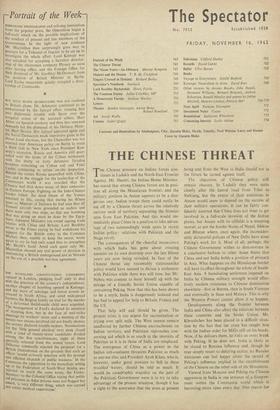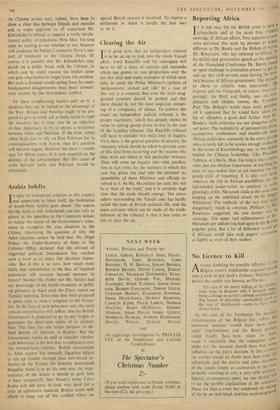THE CHINESE THREAT
Miin Chinese pressure on Indian forces con-
tinues in Ladakh and the North-East Frontier Agency. Mr. Shastri, the Indian Home Minister, has stated that strong Chinese forces are in posi- tion all along the Himalayan frontier, and the military position in Assam appears to be a dan- gerous one; Indian troops there could easily be cut off by a Chinese thrust across the relatively narrow neck of territory separating the frontier area from East Pakistan. And this would im- mediately place China in a position to take advan- tage of two outstandingly weak spots in recent Indian policy: relations with Pakistan and the Naga revolt.
The consequences of the cheerful insouciance with which India has gone about creating enemies on its own doorstep over the last fifteen years are now being revealed. In face of the Chinese threat any reasonably statesmanlike policy would have seemed to dictate a settlement with Pakistan while there was still time, but Mr. Nehru was content to buoy himself uji with the mirage of a friendly Soviet Union capable of restraining Peking. Now that this has been shown to be a myth, India is dangerously isolated and has had to appeal for help to Britain, France and the US.
That help will and should' be given. The present crisis is too urgent for recrimination or crying over spilt milk. The West cannot remain unaffected by further Chinese encroachment on Indian territory, and Pakistani reproaches con- cerning aid which is as much in the interests of Pakistan as it is in those of India are misplaced. The emergence of China as a power in the Indian sub-continent threatens Pakistan as much as anyone else, and President Ayub Khan, who is, however, under great pressure to fish in these troubled waters, should be told as much. It would be catastrophic stupidity on the part of the Pakistani Government were it to try to take advantage of the present situation, though it has a right to the assurance that the arms at present being sent from the West to India should not in the future be turned against itself.
The objectives of Chinese policy still remain obscure. In Ladakh they were quite clearly after the lateral road from Tibet to Sinkiang, but the extent of their ambitions in Assam would seem to depend on the success of their military operations. It can be fairly con- fidently asserted that China does not want to get involved in a full-scale invasion of the Indian plains, but Assam with its oilfields is a tempting morsel, as are the border States of Nepal, Sikkim and Bhutan where, once again, the inconsider- ately dictatorial policies of New Delhi have done Peking's work for it. Most of all, perhaps, the Chinese Government wishes to demonstrate in a conclusive fashion to other Asian Stites that China and not India holds a position of primacy in Asia. What happens on the Himalayan border will have its effect throughout the whole of South- East Asia. A humiliating settlement imposed on India by Chinese military strength would effec- tively weaken resistance to Chinese domination else-where—first in Burma, then in South Vietnam and eventually in Siam and Malaya. This is why the Western Powers cannot allow it to happen.
Developments along the frontier between India and China also affect the relations between these countries and the Soviet Union. Mr. Khrushchev has been placed in a difficult situa- tion by the fact that the crisis has caught him with the Indian order for MiGs still on his hands. Now, if he delivers them, he risks an overt break with Peking. If he does not, India is likely to be closed to Russian influence and, though he may simply resort to delaying tactics, no Russian statesman can feel happy about the spread of Peking's influence implied in the establishment of the Chinese on the other side of the Himalayas.
Viewed from Moscow and Peking the Chinese aggression in India is one instance of a disagree- ment within the Communist world which is becoming more dpen every day. One reason for
the Chinese action may, indeed, have been to draw a clear line between friends and enemies and to make apparent to all concerned Mr. Khrushchev's refusal to support a really revolu- tionary policy of expansion. Now Mao Tse-tung must be waiting to see whether or not Moscow will condemn the Indian Communist Party's sup- port of resistance to the Chinese threat. Of course, it is possible that Mr. Khrushchev may decide on a public break with the Chinese, in which case he could espouse the Indian cause and gain %a hat kudos he might from this position. But such a decision would spring from far more fundamental disagreements than those immedi- ately excited by the Sino-Indian conflict.
All these complicating factors add up to a situation that can be turned to the advantage of the West. Britain and America ought to be pre- pared to give as much aid as India needs to repel the invaders, but it must also be an objective of their diplomacy to try to ensure a settlement between India and Pakistan. If the time comes when India has to rely on East Pakistan for its communications N't t h Assam, then th's question will become urgent. Kashmir has been a trouble spot for fifteen years. It is now essential to the defence of the sub-continent that this cause of strife between India and Pakistan should be eliminated.







































 Previous page
Previous page